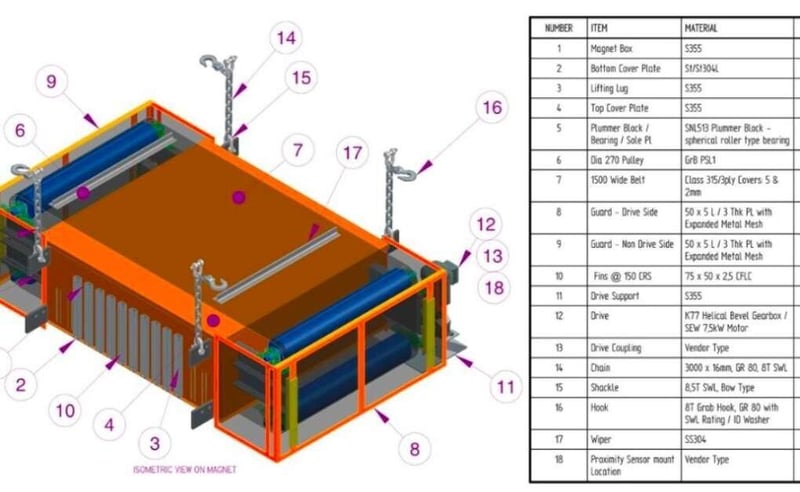Industrial Magnets and Magnetic Separators - A Comprehensive Guide
Written by: Josh Maraney Save to Instapaper
Introduction
In the vast realm of the industrial sector, magnets play an instrumental role, often operating behind the scenes but making a significant impact. Their importance is further magnified when one considers the crucial process of magnetic separation, a technique employed across various industries to segregate magnetic materials from their non-magnetic counterparts.
Types of Industrial Magnets
The world of industrial magnets is diverse, with each type serving a unique purpose. Permanent magnets, known for their persistent magnetic fields, are commonly used in various machinery and devices. Electromagnets, on the other hand, offer the advantage of controlled magnetism, functioning only when an electric current passes through them. Then there are lifting magnets, specifically designed for tasks related to material handling and transportation, ensuring that operations run smoothly and efficiently.
Understanding Magnetic Separation
At its core, magnetic separation is a straightforward concept. It revolves around the principle of attracting magnetic materials to a magnet, thereby separating them from their non-magnetic surroundings. This process is paramount in industries where the purity of products is essential, ensuring that any magnetic contaminants are effectively removed.
Types of Magnetic Separators
The variety of magnetic separators available today is testament to their widespread utility in industrial processes. Overband magnets, with their specific design, are primarily used to capture magnetic particles from a flow of material. Drum magnets serve a similar purpose but in a cylindrical form, often used in conveyor systems. Magnetic pulleys introduce a level of subtlety to the process, working seamlessly within conveyor systems to separate magnetic materials. Lastly, plate magnets, typically installed in chutes or ducts, capture unwanted metal fragments.
Applications of Magnetic Separation
The applications of magnetic separation span a wide range of industries. In mining, it’s an invaluable tool for extracting precious minerals and metals from vast amounts of ore. The recycling sector employs these separators to sift through waste, ensuring that recyclable materials are not lost. Food processing industries rely on magnetic separation to maintain the purity of their products, removing any metal contaminants that might have found their way into the mix. Similarly, the pharmaceutical industry uses this process to ensure drug purity and safety, safeguarding public health.
Advantages of Using Magnetic Separators
The benefits of magnetic separation are manifold. Firstly, it leads to increased efficiency in material separation, streamlining industrial processes. This, in turn, results in enhanced product purity and quality, ensuring that the end consumer receives the best possible product. Additionally, by effectively removing abrasive metal fragments, there’s a marked reduction in equipment wear and tear, prolonging machinery life. From a safety perspective, the removal of potential metal hazards cannot be understated, especially in industries like food processing.
Learn more here:
Challenges and Considerations
While magnetic separation offers numerous advantages, it’s not without its challenges. Factors such as magnet strength, material characteristics, and flow rates can affect separation efficiency. Regular maintenance and checks are essential to ensure that separators function optimally. Moreover, in today’s environmentally-conscious world, the environmental impact of magnetic separation processes is a consideration that industries cannot afford to overlook.
Future Trends in Magnetic Separation Technology
The future holds exciting prospects for magnetic separation technology. Innovations are continually emerging, with designs becoming more efficient and eco-friendly. The integration of magnetic separators with other industrial technologies is also on the horizon, promising even more streamlined processes. As industries worldwide move towards more sustainable practices, the development of green and efficient magnetic separators will undoubtedly be at the forefront.
Conclusion
In conclusion, while magnets and magnetic separators might not always be visible in industrial processes, their impact is undeniable. They ensure that operations run smoothly, products maintain their purity, and equipment lasts longer. As technology continues to advance, one can only anticipate even more significant contributions from these unsung heroes of the industrial world. Find out more from https://africanmagnets.com
Get new press articles by email
Top Click is one of South Africa’s leading full-service digital marketing agencies. Our custom-built, cutting-edge solutions are targeted to help you attract customers, convert leads and grow your business. From SEO and Google Ads to social media marketing and digital design, our measurable marketing campaigns deliver results – and ensure that, in a cluttered online marketplace, you rise... Read More
Latest from
- Choosing the Right Pet Food for Your Animals
- Managing Contracts With Simpler Tools
- New Website to Keep Up with the Demand for Online Pet Food Delivery in South Africa
- Machines That Make Packaging Easier
- The Role of Transit Solutions in Modern Connectivity
- How to Get Cheaper Car Insurance Without the Stress
- Making Radiology Workflows Simpler with the Right Tools
- Reduce Late Payments with These Practical Tips
- A Simple Guide to Choosing the Right Forklift for Your Business
- Keeping Your Car in Good Shape with the Right Services
- Why Property and Asset Valuations Matter
- Finding Quality Engines and Scrap Yard Services
- Practical Guide to Rooftop Tents
- Practical Uses of Vehicle Awnings
- A Look at Engine Choices Across Popular Car Brands
The Pulse Latest Articles
- Education Is The Frontline Of Inequality, Business Must Show Up (December 11, 2025)
- When The Purple Profile Pictures Fade, The Real Work Begins (December 11, 2025)
- Dear Santa, Please Skip The Socks This Year (December 10, 2025)
- Brandtech+ Has 100 Global Creative Roles For South African Talent (December 9, 2025)
- The Woman Behind Bertie: Michelle’s Journey To Cape Town’s Beloved Mobile Café (December 9, 2025)
